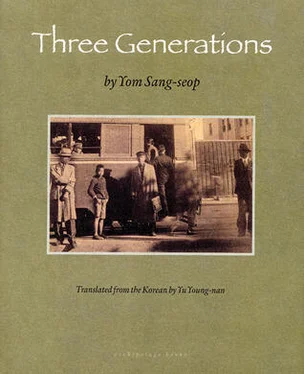Since Pi-hyeok’s departure, Byeong-hwa’s nerves had become frayed. He was more cautious when he went out, always looking over his shoulder, imagining that dark shadows were trailing him. Now that he was involved in a full-fledged mission, he was afraid that the police might even inspect his correspondence. With this fear in mind, he began composing his letter.
I write these letters because I don’t have much to do. I write them to express my opinions, but I might as well stop writing. It’s not that I’ve become busy, but what’s the use when all is said and done? You and I are living in the same era, but sooner or later you will succumb to the values of the times, which your grandfather will hand down to you along with his fortune. You will hang onto these values and settle down with them. Wait until you get the key to his safe, until you get to manage his money. Now, you may think you’ll get to ride the wave of the next generation, but you can’t do that with a heavy safe clutched in your arms, so what else can you do but to hold onto the values of an earlier time as tightly as you can? You know that the unrealistic idea of holding onto a moribund epoch is not only conservative, but is also like a mantis trying to block the advance of a carriage with its arms open wide. Only that path will be open to you. I know you will turn a deaf ear to my sermons, so what’s the use of toying with old sayings? I am disappointed in Pil-sun, whom I have cultivated for several years, but I’m afraid she will end up stagnating. Women are by nature conservative, so we can’t expect them to be pioneers. Age and character may play a role, too, but when I think that I can’t even coax Pil-sun to come along with me, what’s the use of talking to you, even with a plea of a million words? Is it because I’m incompetent? Is it fundamentally wrong to preach or try to sway someone to become like me? You be the judge, but I still believe that a chicken that wanders will voluntarily return to its perch when the time comes. By that I mean that I believe I will end up meeting you and Pil-sun again some day, even though you two may make detours.
As you wished, Pil-sun is living the so-called dream of youth, but what is regrettable is that she has read your letter. This is why I say we should stop writing these silly notes. It is clear that your letters and your cheap sympathy encouraged her to hang onto the values of your epoch when she was actually coming toward mine. Now that things have turned out this way and though it is not unreasonable for someone her age, I wash my hands of the matter. You might as well take over as far as Pil-sun is concerned. Don’t put me between you — do as you please, as much as your resources permit. But I believe that after she wakes up from her dream and returns to reality, she will seek me out again. As for you, you are likely to inherit soon all the customs and family rules maintained by your grandfather, along with his assets. You only desire land deeds, but a day will come when you will regard these deeds as insignificant as your family rules and manners. I know very well that you are conscientious and sensitive to changing times.
As a Christian, your father is a heretic in your grandfather’s eyes, but he will be a heretic to you in terms of the zeitgeist. It would be preferable to leave him to his drink and in the lap of a nineteenth-century doll, but make sure he doesn’t take opium.
And Hong Gyeong-ae? This woman is more likely to end up being mine than your father’s, but she’s a doll of the twentieth century, not the nineteenth. That’s the extent to which I may love her. Enough for now. I have nothing more to write, and besides, I have no desire to write anymore. This has turned out to be a load of nonsense. But if I say something to the point, I may not be able to live out my share of life.

The old man’s condition continued to grow worse, though at a barely perceptible rate, prompting Secretary Ji, Chang-hun, and Clerk Choe to stay in the main room deep into the night. As his health deteriorated, the old man didn’t want to see his son, and for the sake of formality, Sang-hun came in the morning and left at night only to go to sleep, but he was reduced to loitering in the outer quarters.
The old man had his reasons for behaving this way. Believing that his final moments were drawing near, he ordered people to write letters and telegrams to Deok-gi, asking him to come home. As there was no reply, the old man was angry at his grandson, but still he awaited his arrival every morning and night around the time the train arrived.
Unaware of the old man’s requests, Sang-hun volunteered a suggestion. “Your condition is not that grave, and Deok-gi has only several days remaining before his graduation exams. Why don’t you let him stay there?” Naturally, he wanted to comfort his father, who seemed frightened by his condition, but, at the same time, he truly believed there was no need to bring Deok-gi home. His father’s wrath erupted on the spot. He berated Sang-hun, complaining that Deok-gi hadn’t replied to his grandfather’s telegrams and letters because Sang-hun had discouraged him from coming home.
The old man wanted Deok-gi home as soon as possible mainly because he was anxious to settle the matter of his grandson’s inheritance in his presence. Although he didn’t intend to leave his son out in the cold, he preferred to deliver his final words to his grandson. He didn’t believe he’d die from his illness, but there was no knowing when the end would come. Even if he had to repeat the performance after his recovery, he wanted to settle the matter, at least for now. He surmised that Sang-hun was preventing Deok-gi’s arrival and raised hell, announcing that he was going to declare Sang-hun legally incompetent. Sang-hun had no inkling of his father’s intentions. He offered to send a letter or a telegram, but Chang-hun advised against it strongly, insisting that three telegrams had already been sent. Sang-hun imagined his son might have left by now and anticipated his arrival. Several days passed, however, and still no news came. Chang-hun, impatient by now, composed a telegram in front of the old man and went out to send it personally. Again, no reply.
“Mother, I don’t understand. Could he be sick? Is he on his way home? He would reply one way or another. Should we send another telegram?” Deok-gi’s wife asked her mother-in-law. Deok-gi’s mother visited every day now and sometimes stayed overnight, though she was permitted in the main room only once each day. Her father-in-law’s anger had not abated, and he, in part, blamed her and his granddaughter-in-law for Deok-gi’s failure to return home.
“I wonder, too,” said the mother-in-law. “Nobody could be intercepting the telegrams, could they?”
“Who knows? How do we know what sly tricks they have up their sleeves?”
When Deok-hui came home from school, the two women asked her to go out and send a telegram to Kyoto.
A telegram saying that Deok-gi would leave Kyoto arrived at eleven that night. Since the last telegram had been sent over in Deok-hui’s name, the reply in Japanese was addressed to her. The old man didn’t know Japanese, but he could read katakana. He held the telegram his granddaughter-in-law had brought him, his face bright with relief. “Why didn’t he. ” He studied the address and the name a long time before he asked, “Who is this addressed to?”
“To his sister.”
“His sister? Deok-hui?” The old man hadn’t expected this. Deok-gi had the habit of addressing correspondence sent to the house to the “residence of Jo Deok-gi” or to the attention of his baby son.
Читать дальше













